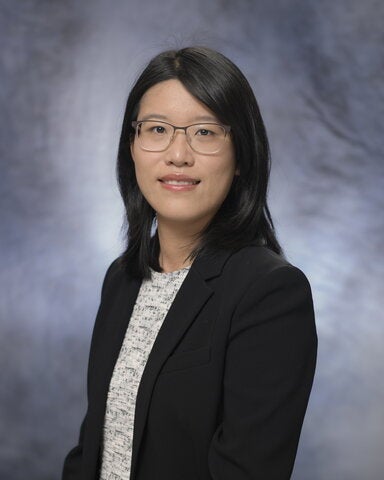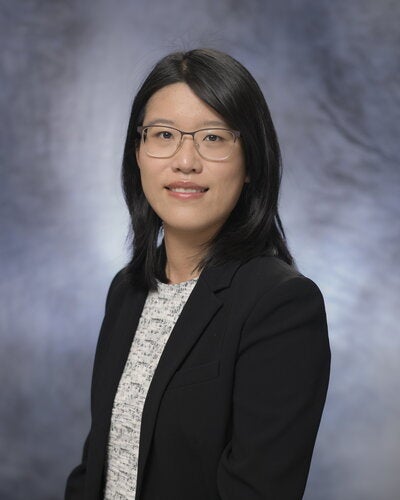

Ruoqi Yu, an assistant professor in the Department of Statistics at the University of Illinois Urbana-Champaign, devises statistical tools to extract truth from observational data. Her work sharpens policy and health research by turning correlation into credible causation.
What initially drew you to your field of study?
I’ve always been someone who asks "why" and seeks to understand the foundational reasons behind the world around us. This curiosity naturally led me to the field of statistics, as it provides powerful quantitative tools to uncover insights and explain phenomena. During my undergraduate studies, I found immense satisfaction in using statistical methods to answer complex questions. This passion for discovery and problem-solving motivated me to pursue a PhD in Statistics and ultimately build a career in this field.
How did your career path lead you to the University of Illinois?
I completed my PhD on the east coast and spent two years on the west coast after graduation. During this time, I visited Champaign while spending time with my husband, and I realized how much I loved the community and quality of life here. On top of that, the Department of Statistics at Illinois is home to incredible people -- both colleagues and students -- who create a supportive and inspiring environment. The combination of personal and professional factors made the University of Illinois the perfect place to continue my career.
What are your primary research interests and current projects?
My primary research interests lie in causal inference for observational studies, with a strong emphasis on applications in health and social sciences. Currently, I’m focusing on the treatment effects of multiple treatments within observational factorial studies and exploring the intersection of matching methods and machine learning. These areas are crucial for advancing the robustness and interpretability of causal conclusions in complex datasets.
How do you see your research impacting your field or society in the long run?
I aim to develop innovative statistical methodologies and computational tools that enhance the design and analysis of observational studies. By improving the ability to draw causal conclusions, my work has the potential to shape evidence-based decision-making in health and social sciences. This can lead to more accurate policy recommendations, improved healthcare interventions, and broader societal benefits from better understanding of causal relationships.
What exciting research projects or collaborations are you currently working on?
One of my exciting collaborations is with an expert in environmental health, where we are studying the effects of phthalate exposures on women’s health. This project not only motivates new statistical methods for causal inference in complex datasets but also addresses critical public health concerns.
How would you describe your teaching philosophy?
My teaching philosophy emphasizes a balanced approach, combining intuition, theory, and practical examples. I strive to create an engaging learning environment where students not only understand the underlying concepts but also see their real-world relevance and applications.
What do you hope students take away from your classes?
I hope my students leave my classes with a strong statistical toolbox that empowers them to tackle complex, real-life problems confidently. Beyond technical skills, I want them to develop a critical mindset for interpreting data and a curiosity for exploring solutions to challenging questions.
How do you incorporate real-world applications or hands-on learning in your teaching?
I make it a priority to discuss real-world examples for every statistical concept we cover in class. These examples highlight the practical importance of the methods and help students connect theory with application. Additionally, I demonstrate solutions to these problems using R, ensuring students gain hands-on experience with computational tools that they can apply in their own work.
What advice would you give to students pursuing a degree in your field?
My advice is to find an area within the field that truly excites you, set clear goals for yourself, and work hard to achieve them. Staying curious and open to learning new concepts is crucial, as is building a strong foundation in both theory and practice.
What’s a fun fact about you that most people don’t know?
My husband and I welcomed our first baby last year! It’s been an incredible and rewarding journey balancing parenthood and academia.
What hobbies or interests do you have outside of academia?
Outside of academia, I’m a big fan of Zumba, table tennis, and Chinese calligraphy -- they keep me active and creative. I’m also a foodie who loves exploring new restaurants and cuisines. Sharing good food with family and friends is one of my favorite ways to unwind.
What are your long-term goals, either professionally or personally?
Professionally, my long-term goal is to become a leading expert in interdisciplinary research by developing innovative statistical tools that advance our understanding in health and social sciences. Personally, I hope to be the best mom my daughter could ever have—supportive, loving, and inspiring in all aspects of her life.
Faculty profiles are an ongoing feature, so stay tuned to learn more about department faculty as more profiles are posted.
Ji Eun Kim is a staff writer for the Department of Statistics. If you have news to share, please contact the Statistics News Group at stat-marcom@illinois.edu